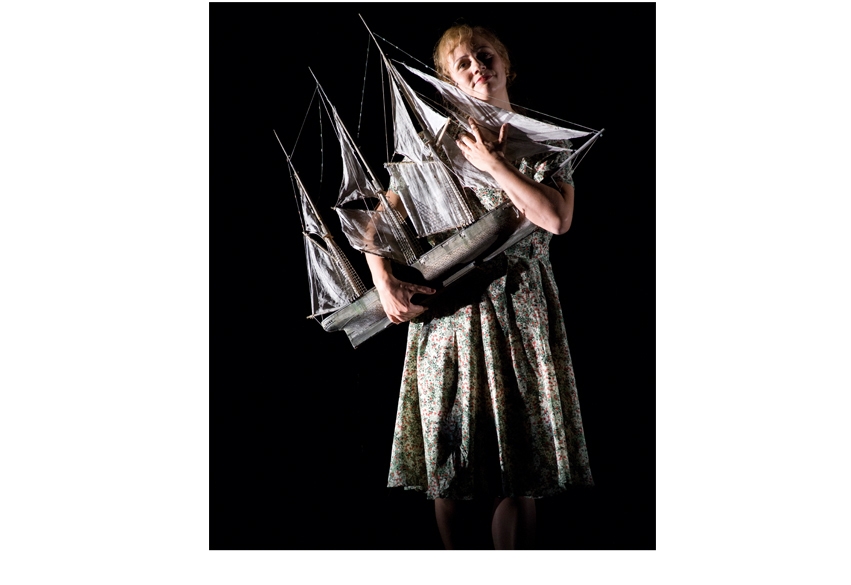Compelling, succinct, elemental, The Flying Dutchman, Wagner’s first indisputable masterwork, wouldn’t seem to present any great problems for an opera house, unless his directions about heaving ships are taken too literally — very unlikely — so why does one never see it well produced? The Royal Opera has made especially heavy weather of it, but not in the right sense, for the last quarter-century. Tim Albery’s 2009 production has egregious faults, and few merits: above all, it fails to establish any potent atmosphere, and the singers are left largely to their own devices, with unhelpful scenery to stagger around on.
The present revival is nonetheless very worthwhile, thanks to the powerful rendering of the two leading roles. As the Dutchman, Egils Silins, a Latvian who sang a superb Wotan in Manchester three months ago, delivers a great performance. Ideally one would like a slightly larger voice, but his is beautiful, steady, legato rather than declamatory, and he lives the words and the drama with urgency. Most of those things are true of Anja Kampe as Senta, too, though occasionally on the first night she erred on the side of overenthusiasm, but that she managed to create so vivid a character while nursing a toy galleon, substitute for the Dutchman’s portrait, and wearing a little late-1940s dress is a tribute to her artistic integrity.
None of the other singers is in this league. Stephen Milling lacks the strong bass needed for Daland, and fails to realise the Rocco-like complexities of the character. Endrik Wottrich aims for a more robust Erik than normal, all to the good, but his voice ran out on him by the time he got to his aria.
The strangest feature of the evening was the conducting of Jeffrey Tate, whose long absence from the UK has been a scandal. He began very much as he didn’t mean to go on: tremendous surging strings, desperate brass, the Overture’s opening sounded as if it was going to be classic. But no sooner did he get to Senta’s theme than the brakes were applied, and never released. Since I happened to be in the right mood, the trance-like conducting of most of the work, until the battle of the choruses, was something I found moving, and it gave the principals a chance to dig into their roles. But I can see why people might have wondered what had happened to the voltage. The clarity of the orchestral texture throughout couldn’t be disputed, so that one noticed Weber’s influence much more than usual. Much to its credit, the Royal Opera plays the work straight through without an interval, something Wagner never heard but surely would have approved of. The inadequacies of the staging faded as the magnetism of the performance, if you felt it that way, increased.
Opera North knows no limits to its ambitions, as its putting-on of a new production of Tchaikovsky’s The Queen of Spades, that weird, sprawling but oddly gripping opera, shows. The first night was not a great success, but nothing like an irredeemable failure. There could be no two views about this conducting, or the mighty playing of the orchestra: Richard Farnes started exactly as he meant to go on, with an intensity combined with a suppleness that drew what can seem disparate elements into an inevitably progressing melodrama.
The singers were a curious obverse of those in the Dutchman: all the minor roles, some of them important and demanding, were excellently taken, William Dazeley as Yeletsky, that incipient Gremin, and Jonathan Summers as Tomsky above all. But what had happened to the leads? Jeffrey Lloyd-Roberts is a singer whom I usually admire fervently, and is the finest Grimes I have ever seen or heard, and that includes Jon Vickers. Like Vickers, Lloyd-Roberts lives dangerously, and on this occasion not only courted but also wed disaster. In Act I his voice cracked repeatedly, intonation was dire, and he overacted as if in a decadent 1920s Viennese opera. He must have learned his lesson, for in the other acts he calmed down, but by then the figure of Herman had nearly disintegrated.
The other major disappointment was Orla Boylan’s Lisa. Boylan has often been a great singing actress, but on this occasion she was neither. The role eluded her from start to finish, and the lovely, passionate singing she has so often produced were at most hinted at. I can’t believe that these two artists won’t improve during the run. Dame Josephine Barstow, on the other hand, was very much herself, and the Countess became, in her parlando interpretation and macabre acting, a caricature of Grand Guignol. The tone of The Queen of Spades, so unlike any other Tchaikovsky work, is so peculiar that perhaps that is what was intended.
Neil Bartlett’s production leaves all options open, with minimal scenery and routine movements. When the singing rises to the level of the conducting, this will be worth travelling a long way to see.






Comments